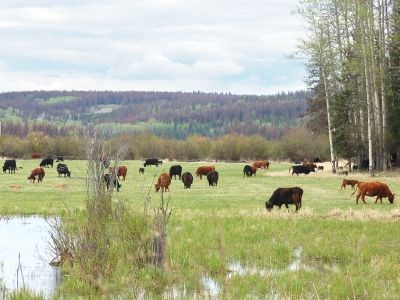Kevin Reed’s ardour for Manitoulin Island was cultivated from a young age, as he spent successive summers growing up on its rocky shores. Decades later, he’s translating his affection into a much-needed investment in the Island’s agricultural industry.
As chair and CEO of Blue Goose Capital Corp., Reed heads up the financial arm of Blue Goose Cattle Company, a B.C.-based, family-owned cattle company that produces premium and certified organic beef. The majority of the 1.1 million acres of land it owns is located in B.C., but Reed is steering the company east towards Manitoulin Island, where the company has been buying up properties to add to its portfolio.
“When I went into semi-retirement mode a few years ago, I started buying farmland on Manitoulin and it was sitting on my ranch pondering an opportunity in ag that it came to me that there’s a massive opportunity in ag and I didn’t even think about I,” Reed said. “I came back out of retirement and started building Blue Goose.”
Approaching company founder Doug Sinclair, Reed found a partner willing to collaborate on growing the company and, last December, brought on Toronto-based asset management company Dundee Corporation as a major stakeholder. High-end grocery store chain Whole Foods is the label’s primary distributor.
Blue Goose’s biggest coup, from a local perspective, is buying out Mike Meeker, an Evansville aquaculturalist who’s grown rainbow trout at Meeker’s Aquaculture on Lake Wolsey since 1984.
Meeker has arguably been the most vocal advocate for the province’s aquaculture industry, chairing the Northern Ontario Aquaculture Association, working with government to define industry regulations and pioneering innovations such as Meeker’s Magic Mix, a compost comprising fish offal and waste sawdust.
Meeker will stay on as the head of Blue Goose’s aquaculture division, and Reed views the collaboration as a true partnership.
“I couldn’t have any better partner in that guy, and he is a perfect fit for what we’re looking for,” Reed said. “He and his staff there are just tremendous assets; they’re passionate about what they do and that is just so important for us, because people like Mike will give Blue Goose the absolute best quality product and that allows us to take it to market and put a brand around it.”
There will be benefits for other Islanders too. Reed said Blue Goose’s “first preference” is to hire locally and will require producers, farmhands, truck drivers and farm managers to oversee its Island operations.
In a slowing industry that’s seeing family farms sold off at an alarming rate, Reed is optimistic about Blue Goose’s viability. There’s demand out there, he said, in a niche industry that includes executives, athletes, celebrities and other high-end clients who want high-quality, organic beef.
“Our end target market is, simply put, a person who wants to live to be 200,” he said. “I say that tongue in cheek, but really, it’s the person who cares about what they eat, wants to eat clean food and is the active-type person.”
Whole Foods is aiming to grow its Canadian operations from eight stores to 35 in the next three years, while the American trend is even more robust: 300 stores to 1,000. Customer demand for the store and its products is “off the charts,” Reed said.
Key to Blue Goose’s success is a “vertically integrated” approach that means the company takes on all aspects of production—farm operation, animal husbandry, processing and wholesaling to the end customer—which allows the company to get a good return on its investment, Reed said. Blue Goose plans to be a client of the new Manitoulin Island Community Abattoir in Providence Bay, which is scheduled to be up and running this fall
“If you’re just a cow-calf operator, or just a producer without going the full route of vertical integration like we are, it’s a very tough business to be in,” Reed said. “I’m excited because, in the history of Canada, what we’re about to undergo has never happened before.”
A number of Canadian farms are up for sale at the same time that more of the world’s population is turning to a protein-based diet, he said, while financial gurus are eyeing food production as a viable investment opportunity, making this an ideal time to enter the market.
As the company grows, Blue Goose will continue to look for other product lines to launch into and continues to scope out additional properties, including on Manitoulin.
“We’re very patient and we want to fit into the community,” Reed said. “I’ve been going there since I was 12. I certainly understand the culture there and maintaining the culture is very important to us, so if we find farmers who are good partners for us and have good properties we’d consider it.”




